GE Profile French door fridge leaking water: Stop the Drip!
We may earn affiliate fees for purchases using our links (at no additional cost to you).
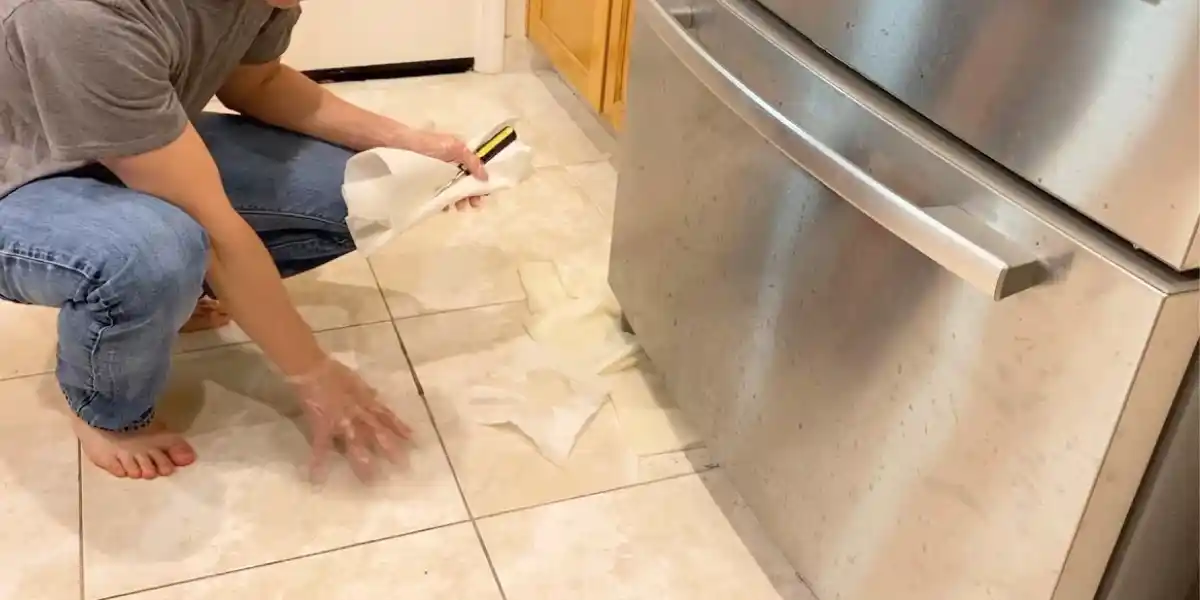
Is your GE Profile French door fridge leaking water? Dealing with a leaking water issue can be a real hassle.
Fear not, for we’re here to guide you through the solution! Are you tired of mopping or wondering why your fridge is suddenly springing leaks? We’ll unravel the mystery and empower you with practical steps.
It helps you to put an end to the drip-drip dilemma. Let’s dive into this troubleshooting journey and bid farewell to fridge leaks for good!
GE Profile French Door Fridge Leaking Water
A water leak in your GE Profile French door fridge can stem from various sources. It gets rid of these annoying issues it is important to find out the sources.
Here is a list of potential culprits that can cause water leakage.
Blocked Defrost Drain
A common culprit is a blocked defrost drain. It causes water to accumulate and eventually leak. This blockage can occur due to food particles, ice buildup, or debris.
Clogged Ice Maker
If your fridge has an ice maker, a clog in the ice maker’s water supply line can lead to water leakage.
Damaged Water Line
Any damage or deterioration in the water supply line can result in water escaping. It causing a leak.
Safety Considerations When Troubleshooting Water Leakage
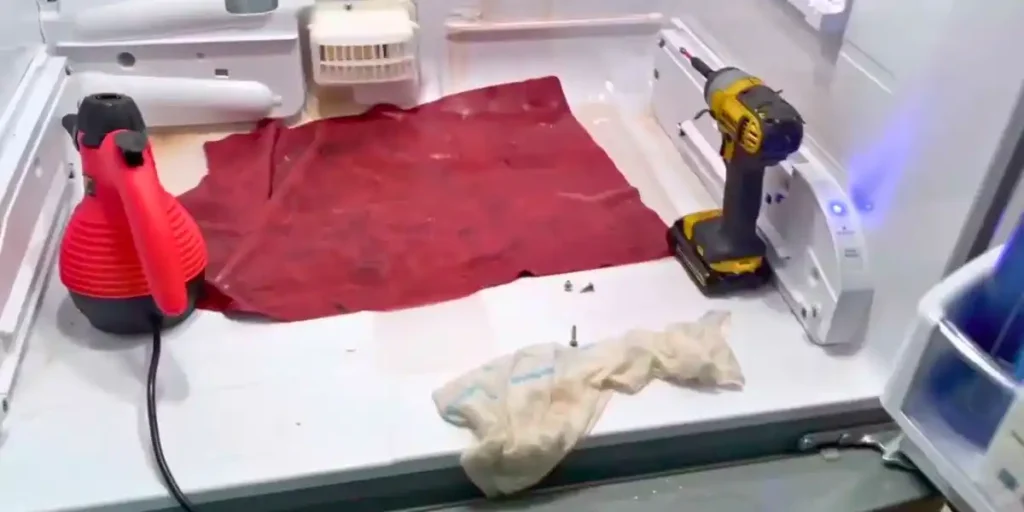
Follow the below safety tips to avoid unwanted issues during troubleshooting water leakage.
Mindful Inspection
As you delve into troubleshooting water leakage from the Fridge, remember that safety is paramount.
Start by unplugging the fridge from the electrical outlet. It eliminates any risk of electrical shock.
Carefully inspect the electrical components around the area where you suspect the leaks.
Never touch exposed wires or components while the fridge is still plugged in. When in doubt, consult a professional technician to avoid unnecessary risks.
Caution with Water and Wet Surfaces
Water leakage means moisture around the fridge. Keep the floor and surrounding area dry to prevent slips and falls.
Wipe up any water immediately using absorbent materials like towels or cloths. Don’t underestimate the potential dangers of wet surfaces.
While investigating the source of the leak, use non-conductive tools. Avoid standing on wet surfaces. Your safety comes first. So take every precaution to avoid accidents.
Gloves and Eye Protection
During troubleshooting, it’s possible to encounter sharp edges or objects. That can cause injury. Protect your hands by wearing sturdy gloves.
If you are working with potential water leakage, consider wearing eye protection. Water can carry debris and contaminants.
That may pose a risk to your eyes. Staying safe means staying vigilant. So being proactive about personal protective gear.
Avoid Contact with Refrigerant
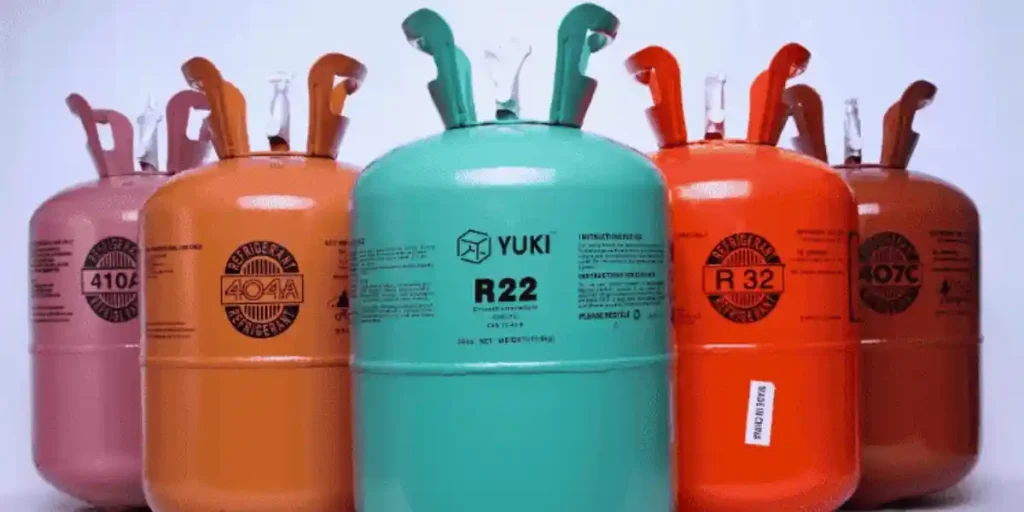
Modern fridges often use refrigerants to cool the air. If your troubleshooting journey takes you to the cooling system, exercise extreme caution.
Refrigerants are potentially harmful if they come in contact with your skin. Should you suspect a refrigerant leak, halt your troubleshooting immediately.
Seek professional assistance. Only licensed technicians should handle refrigerants to ensure safety and proper handling.
Mindful Use of Tools
When disassembling parts of your GE Fridge for troubleshooting, choose your tools wisely.
Using tools not intended for the task can lead to accidents or damage to the appliance.
Make sure your tools are in good condition, and follow any user manual instructions. If you’re unsure about a specific tool’s appropriateness, seek professional help.
When to Seek Professional Help
Troubleshooting water leakage can be a DIY task. But there are instances when professional intervention is necessary.
If the issue involves complex electrical components it’s wise to call in an expert. Your safety is worth the investment in a skilled technician.
He can address the problem without compromising your well-being. Recognize your limits and prioritize safety above all.
Keep safety at the forefront of your efforts while troubleshooting water leakage. Remember that your well-being takes precedence over any DIY task.
What Could be Causing the Fisher and Paykel Fridge Water Dispenser Red Light Issue?
One common issue that Fisher and Paykel fridge owners face is the fridge water dispenser red light problem. This light may indicate various causes such as a malfunctioning water filter, clogged lines, or an electrical issue within the dispenser. Professional assistance is recommended to diagnose and resolve the specific underlying cause.
Can Turning Off the Defrost in My Refrigerator Stop the Water Leak?
Turning off the defrost in a refrigerator is not recommended to stop a water leak. The defrost function prevents excessive ice buildup, which can cause leaks. Instead, address the underlying issue causing the leak or seek professional assistance for efficient resolution. Turn off defrost refrigerator only when necessary for maintenance or cleaning purposes.
Step-by-Step Troubleshooting Guide
Inspect and Clear the Defrost Drain
Firstly, check if the defrost drain is blocked. Access the drain through the back panel of the freezer.
If blocked, carefully remove the debris, ice, or dirt. That causes the blockage. After removing all the debris hopefully you can solve the blockage.
Examine the Ice Maker
If your fridge has an ice maker, inspect the water supply line. Look for clogs or kinks.
Gently clean or replace the water line as needed. Ensure a flawless water supply to fix water leakage.
Check for Damaged Parts
Inspect the water supply line for any visible damage. If you find any leaks, cracks, or splits, replace the damaged section of the line.
Adjust the Fridge’s Level
Sometimes, improper leveling can cause water to pool and leak. Use a level to ensure your fridge is sitting evenly on the floor. Even placement is highly important to ensure smooth operation.
Tips to Prevent Water Leaks from GE French Door Fridge
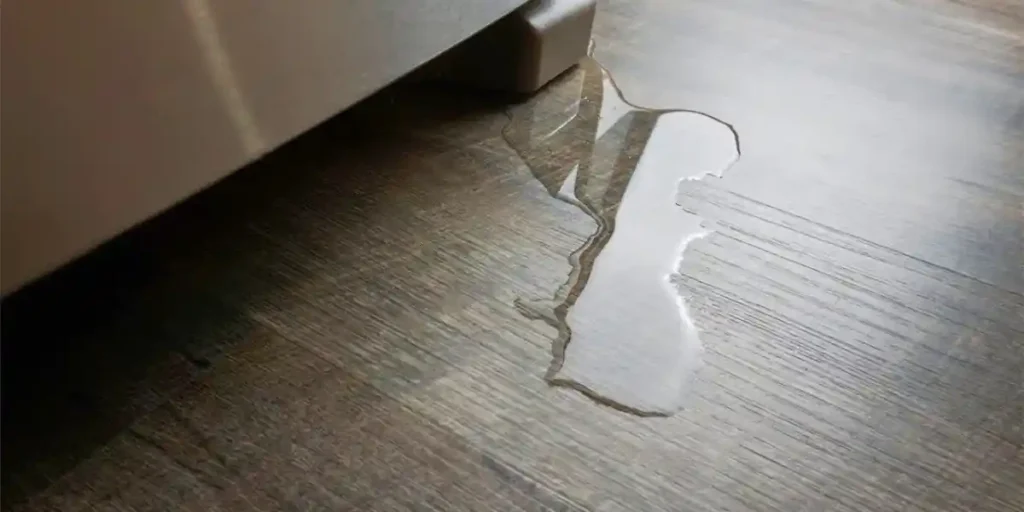
To avoid water leakage you can take some maintenance steps. Let’s know some tips that help you to prevent water leakage.
Inspect Your Water Supply Connection
Make sure you inspect the water supply connection to your Fridge. Check for any kinks, bends, or damage in the water supply line.
If you notice any, immediately replace the water line. It will prevent potential leaks.
Also, ensure that the water line is securely connected to both the fridge and the water source. That eliminates any chances of water seepage.
Examine the Door Seals
The door seals, also known as gaskets. It plays a crucial role in preventing water leakage from your fridge.
Carefully examine the seals. Ensure that they are clean, free from debris, and properly attached to the door.
If you notice any cracks, tears, or signs of wear, it’s time to replace them. Faulty seals can allow warm air to enter the fridge. That leads to condensation and potential leaks.
Level Your Fridge
An improperly leveled fridge can lead to water accumulation and leaks. Use a leveling tool. Ensure that your Fridge is perfectly level both from front to back and side to side.
This prevents water from pooling in unwanted areas inside the fridge. Also, it reduces the risk of leaks.
Clear the Drain Tubes
Drain tubes are located at the back of your fridge. It helps to remove excess water produced during the cooling process.
Over time, these tubes can get clogged with debris or ice buildup. That leads to water leaks.
Gently clean the drain tubes using a soft brush or a pipe cleaner. Regular maintenance of these tubes prevents water from backing up and causing leaks.
Monitor Freezer Temperature
An excessively cold freezer can result in ice buildup. That can eventually lead to water leaks. Keep an eye on the freezer temperature settings.
Make sure that they are not set too low. Ice accumulation can obstruct the normal flow of water.
It causes leaks to occur. So, it is essential to maintain an optimal freezer temperature.
Check the Ice Maker and Water Dispenser
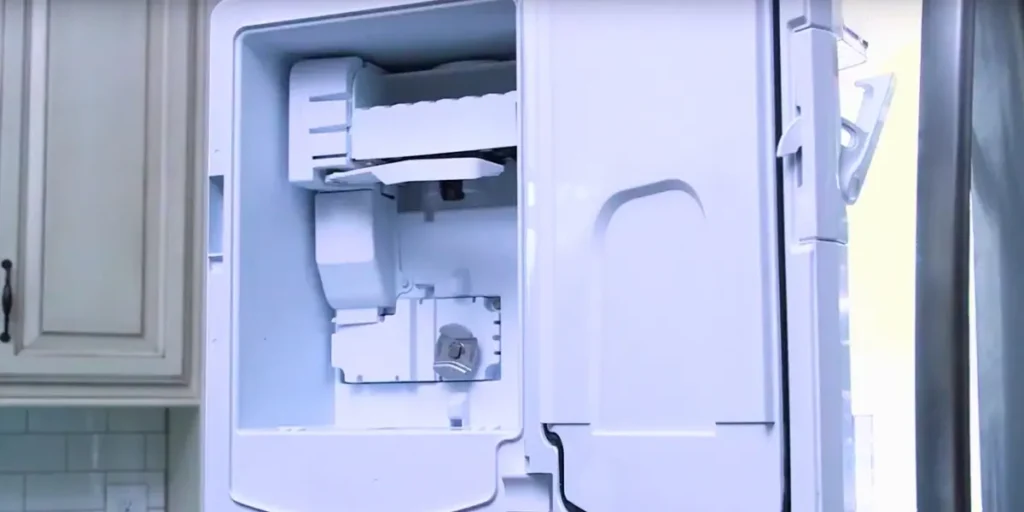
Both the ice maker and water dispenser are potential sources of water leaks. Inspect the connections and hoses leading to these components.
Ensure that they are tightly connected and not damaged. If you notice any cracks or leaks in the hoses, replace them immediately. It will prevent water from escaping and causing a mess.
Regularly Defrost the Freezer
Ice buildup in the freezer affects temperature. That can also lead to water leakage. Regularly defrosting the freezer prevents excessive ice accumulation.
Follow your fridge’s user manual for instructions on proper defrosting methods. By keeping the freezer ice-free, you reduce the chances of water leaks.
It ensures optimal cooling performance. Preventing water leaks from your GE Fridge involves several maintenance steps.
Follow the above tips to ensure that your fridge remains leak-free. It helps you to avoid the inconvenience of water leaks and potential damage to your appliance.
FAQs
Can I Fix the Leaking Issue Myself?
Should I Turn Off the Fridge Before Troubleshooting?
How Often Should I Clean the Defrost Drain?
Can I Use a Hairdryer to Thaw the Ice Buildup?
Is There a Quick Fix for a Clogged Ice Maker?
Conclusion
GE Profile French door fridge leaking water can be a frustrating ordeal. But armed with the right knowledge, you can tackle it effectively.
By understanding the potential causes, and following the troubleshooting guide you can easily diagnose and address the problem.
Remember, your refrigerator is a vital appliance. Regular maintenance and repairs promptly can save you from further inconvenience.